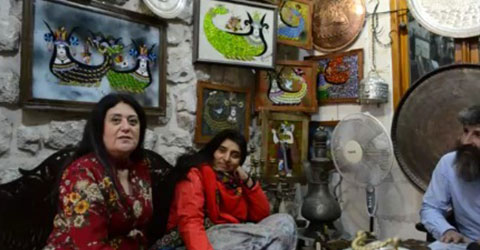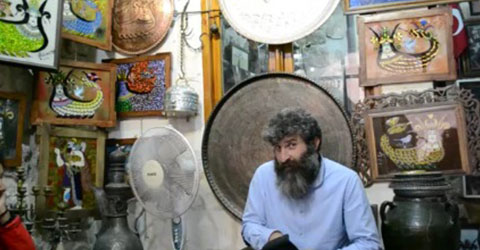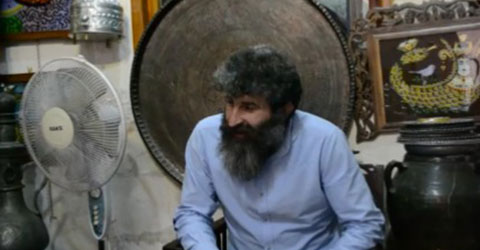No products
THE STORYTELLER
Harut and Marut were two angels who worked as judges in two different cities, one in Babylon and the other in Egypt, who lived like human beings during the day, taught people knowledge, provided information and facilitated their work, and retreated to the sky at night.
Zuhra, a legendary, beautiful woman whose fame traveled from land to land, had a case one day. She first appeared before Harut and told him her problem. Harut said, "I will take care of your business, but you will be with me."
She gave him a place and made an appointment.
Then she went to Marut and told him her problem. He gave the same answer as Harut, but Zuhra, who was very clever, gave Marut an appointment at the same time and place. Harut and Marut met at the same place at the same time, and although they were very embarrassed, they accepted what happened to them. When Zuhra made the condition "I will be with you if you drink wine with me", they both got drunk. A man saw the three of them together. Zuhra asked them to kill this man because if they did not kill him, he would tell everyone. The drunken men eventually became murderers.

Zuhra, for the last time, said "I will be with you if you teach me what you say before you retreat to the sky" and said the talismanic words, retreated to the sky and became the "Star of Zuhal"...
In a fairy tale country, one wants to be a fairy tale hero made of foam while in Mardin, while listening to Abu Burak, aka the storyteller... There would be neither pain nor reality in this land then... everything would be illusion and everything would be fake, just like a dream...
When my dear friend Marwan and I entered the workshop of my beloved storyteller, Abu Burak, in Mardin Bazaar, he said, "Everyone wants to come here, but only those who have the wind at their backs can enter. There is coming here and there is leaving," he said. "You are seeking, not everyone who seeks finds, but it is always the seekers who find."
On the sofa across from her sat the beautiful Zuhal, dressed in a red dress and wrapped tightly in a shahmaran embroidered veil that she pulled up to her neck. My storyteller was telling her the story of the star Zuhal, and as she told it, Zuhal was shrinking a little more under the blanket, like a timid child.
The four walls of the workshop were covered with copper and glass Shahmerans and calligraphy with the Kun feyekün prayer and other prayers. All the other objects complemented the mesmerizing atmosphere inside. I was in a strange state of calmness and serenity, like a shiver, a feeling I had never felt before.

I wanted to write an article about him and I asked for his permission. Although he graciously agreed and told me that he liked oral narration and word of mouth rather than written narration and that it strengthens the mind and memory, I was not convinced. I wanted Marwan to record our conversation on camera and I would write it down later.
Then it got even more interesting. "Okay! Ask!" he said, waiting for my questions. I was just thinking, he was answering without asking. I was thinking and he was answering. He was silent and staring, and I was continuing to answer the questions I was thinking. Then he said "go on, ask your answers!" I started crying and Marwan turned off the camera...
"We are all soup in the same pot. Some bitter, some sweet. But if one flavor were missing, it wouldn't taste the same. Sometimes we are covered with dust, covered with dust. Maybe we need to shake off the dust, throw it away, wash it off, to make it taste better. Crying is also a way to purify, to shake off..."
"When I entered here 15 minutes before you, I was like a hot pepper," Zuhal said later. "I am the hot pepper in the soup, Mukaddes!" she said.

"You are honey. You sweetened our soup with your taste..." Zuhal lived in Germany. Every year she spent her vacations in Mardin, where she came running every year, and was drawn to the workshop. Her eyes sparkled as she recounted what had happened to her years ago, and a warm excitement took the place of the chills she had seemed to be shivering with. "One day I had a very big accident," he said. "All my bones were shattered, I was bound together with platinum, my heart was restarted. The Japanese have an art, when a glass breaks, they glue it together with gold dust, and it becomes more valuable than before because of the gold. In fact, the most valuable part is the broken part. I am glad that this bad incident happened to me, I am thankful for it every day. Because my life changed that day. I look different to people now. I am different from them. And when I look back, I say how my years were wasted, but nothing is a coincidence and nothing is in vain..."
It was giving me answers I had been waiting for years, answers to questions I had not asked. During the hours I stayed there, I was in the moment and I was there. Time flew by as fast as a few seconds. It was like a dream and I was so excited that I had nothing left in my mind to write. He knew what was in my mind again...
On the first page of the only surviving copy of the hand-glued, black leather-bound notebook in which Thierry Payet had compiled his words, he wrote my name in calligraphy with a reed dipped in ink and handed it to me.
"The answers to your questions are here," he said. The first sentence I saw as I immediately took it and flipped through it with excitement: "People come to this workshop and start crying". I was not the first to cry here, nor would I be the last. And he was already used to all this...
Nowadays, each paragraph of the notebook, which I never leave my side for a moment, contains the words he spoke and said at different times; and me... I shuddered again with each sentence... I could write a book with each sentence...
Mukaddes Pekin Başdil
Researcher-Author

